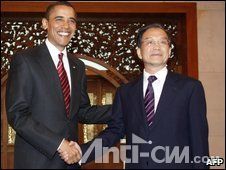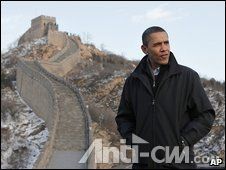|
|
China 'steps up US cyber-spying'
http://news.bbc.co.uk/2/hi/asia-pacific/8369707.stm
Page last updated at 04:17 GMT, Friday, 20 November 2009

The US and China need, yet seem to fear, each other

A lonely figure on the Great Wall of China
China's military and economic power, a US advisory panel on US-China relations has warned.
Its members urged the US Congress to ensure the country was adequately protected against Chinese spying.
The report was published in the same week that US President Barack Obama made his first official visit to China.
A Chinese embassy spokesman in Washington dismissed the allegations as baseless and irresponsible.
Sophistication?
The report - which says China's spying is becoming more intense and sophisticated - was produced by the US-China Economic and Security Review Commission.
"China is changing the way that espionage is being done," said Carolyn Bartholomew, who chaired the commission.
Col Gary McAlum, a senior military officer, told the commission the US defence department had detected 54,640 malicious cyber incidents to its systems in 2008, a 20% rise from a year earlier.
This figure was expected to jump 60% this year, he said.
Not all these attacks are from China, but China was the largest culprit, the report said.
"A large body of both circumstantial and forensic evidence strongly indicates Chinese state involvement in such activities," the commission said in its 367-page report to Congress.
"China's peacetime computer exploitation efforts are primarily focused on intelligence collection against US targets and Chinese dissident groups abroad."
The report also said that Beijing was building a navy that could block the US military from reaching the region if fighting should break out between China and Taiwan.
The 12-member bipartisan commission was set up in 2000 to analyse the implications of growing trade with China.
'Cold War fantasy'
The release of the report came as Mr Obama ended his first official trip to Asia, which included several days in Beijing, where he had extensive talks with President Hu Jintao.
Wang Baodong, spokesman for the Chinese Embassy in Washington, called the spying allegations "baseless, unwarranted and irresponsible".
He called the commission's suggestion that China's navy was being built up to challenge the US in the Pacific a "Cold War fantasy".
Mr Wang criticised the commission for recycling old, unproven allegations and for issuing an annual report "aimed at misleading the American public"
More broadly, the report expressed concern about the practice of reward and punishment practised over foreigners seeking access to China, saying it stifled their freedom to raise questions.
The commission also criticised China on its trade policy and said the US should support Taiwan's military. Mr Obama has yet to decide on the latest Taiwanese arms request.

|
|